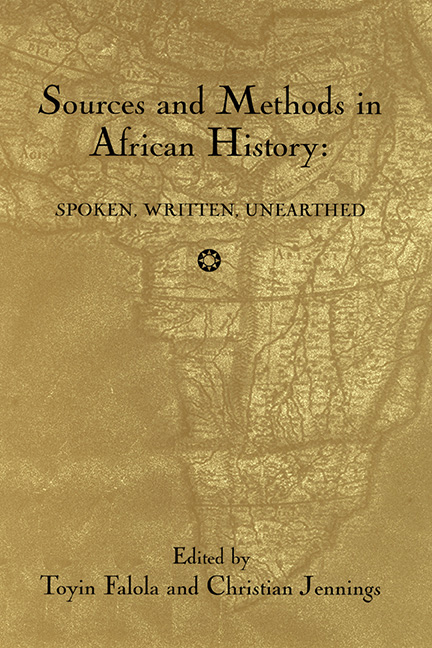Book contents
- Frontmatter
- Dedication
- Contents
- Acknowledgments
- Introduction
- Part I Archaeological Sources
- Part II Africa and the Atlantic World
- Part III Documentary Sources
- Part IV Oral Tradition
- 14 Section Introduction: Oral Tradition: Classic Questions, New Answers
- 15 Narratives on Pilgrimages to Mecca: Beauty versus History in Mande Oral Tradition
- 16 Kingship and the Mediators of the Past: Oral Tradition and Ritual Performance in Nupeland, Nigeria
- 17 Passages in a Struggle over the Past: Stories of Maji Maji in Njombe, Tanzania
- 18 Maisha: Life History and the History of Livelihood along the TAZARA Railway in Tanzania
- Part V Innovative Sources and Methods
- Contributors
- Index
17 - Passages in a Struggle over the Past: Stories of Maji Maji in Njombe, Tanzania
from Part IV - Oral Tradition
Published online by Cambridge University Press: 25 October 2017
- Frontmatter
- Dedication
- Contents
- Acknowledgments
- Introduction
- Part I Archaeological Sources
- Part II Africa and the Atlantic World
- Part III Documentary Sources
- Part IV Oral Tradition
- 14 Section Introduction: Oral Tradition: Classic Questions, New Answers
- 15 Narratives on Pilgrimages to Mecca: Beauty versus History in Mande Oral Tradition
- 16 Kingship and the Mediators of the Past: Oral Tradition and Ritual Performance in Nupeland, Nigeria
- 17 Passages in a Struggle over the Past: Stories of Maji Maji in Njombe, Tanzania
- 18 Maisha: Life History and the History of Livelihood along the TAZARA Railway in Tanzania
- Part V Innovative Sources and Methods
- Contributors
- Index
Summary
Introduction
Tanzania's Southern Highlands are rich in sites of commemoration. Burial grounds and places of ancestor veneration evoke the histories of clans and the succession of generations. Churches and sites of abandoned mission stations recall the generations of the early twentieth century who embraced the Christian faith. Other sites memorialize wars, including the campaigns that pitted the famous Hehe leader Mkwawa against the Germans, and also the Maji Maji conflict of 1905–7. Among the areas where sites of these sorts are found is Njombe, one of the districts in the Iringa Region portion of the Southern Highlands. At the oldest Christian mission in Njombe, Kidugala, visitors to its well-known school and seminary are reminded that its church stood at the heart of the compound where African Christians and German Lutheran missionaries took refuge against the rebels in 1905. Far to the east, at the village of Lupembe, churchgoers emerge from Sunday services to stroll around the still-standing house where the missionary Christian Schumann offered refuge to his congregation in 1905. Should they pause to examine the rusting cannon barrel in the courtyard, they may notice that it is stamped “1904,” the date of its casting.
At Utengule, visitors must scale a very steep hill should they wish to view a monument erected with the aid of the Historical Association of Tanzania in 1986. For their effort they are rewarded with an inscription informing them that they stand on the site of a mass execution committed by the Germans in the aftermath of Maji Maji. At Yakobi Village, by contrast, visitors need stroll no more than a few dozen yards around the parish church to find several memorials. One is the grave of a German medical officer killed at the height of Maji Maji in early 1906. Another marks the one hundredth anniversary of the founding of the Yakobi parish in 1898. A third is the house now occupied by the Lutheran pastor of Yakobi. This very house played a key role in the best-remembered incident of the Maji Maji period in Njombe. For in it, Yakobi's Christians, who included the German pastor, Paul Gröschel, Gröschel's wife, and numerous local converts, anxiously awaited attack for several days in September 1905.
- Type
- Chapter
- Information
- Sources and Methods in African HistorySpoken Written Unearthed, pp. 295 - 311Publisher: Boydell & BrewerPrint publication year: 2003



